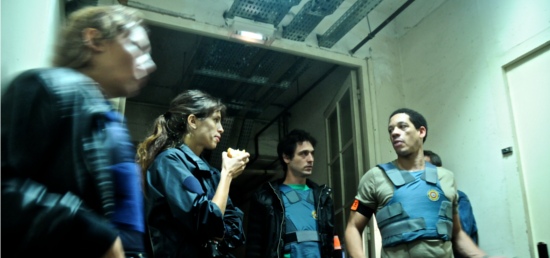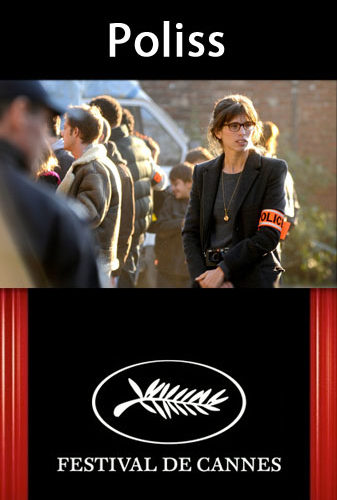
In Poliss, an ensemble cop drama, the action centers on a disturbing crime trend spreading through France and other parts of Europe. The crime at hand is abuse perpetrated against young children. It’s a subject matter that the very mention of can illicit feelings of disgust and anger. However in director Maïwenn‘s thoroughly detailed tapestry of a squad designed to handle these unfathomable crimes, the female filmmaker is able to bring an air of humanity to both sides of the story. Grounding the film in reality is important for its resonance, as each member of the squad feels both genuine and conflicted. The result is an intense and lifelike portrayal of cops dealing with seriously profound issues.
 The Child Protection Unit is compromised of 11 members, and interestingly enough the film doesn’t solely focuses on one individual. Sure each character has a story, a life that defines their personality, but the manner in which they are interwoven is incredibly compelling. Instead of a single protagonist, we have a diverse squad of different genders and race to show the true diversity of these teams of police as opposed to a super cop dealing with everything. Some of the most intense scenes come during the interrogation scenes, questioning mothers mistreating their children, fathers sexually abusing their daughters and children forced to pickpocket for food. While the subject matter is definitely uncomfortable at times, Maïween has incredible compassion for the cops devoting their lives to these horrors and the unfortunate pain of the victims.
The Child Protection Unit is compromised of 11 members, and interestingly enough the film doesn’t solely focuses on one individual. Sure each character has a story, a life that defines their personality, but the manner in which they are interwoven is incredibly compelling. Instead of a single protagonist, we have a diverse squad of different genders and race to show the true diversity of these teams of police as opposed to a super cop dealing with everything. Some of the most intense scenes come during the interrogation scenes, questioning mothers mistreating their children, fathers sexually abusing their daughters and children forced to pickpocket for food. While the subject matter is definitely uncomfortable at times, Maïween has incredible compassion for the cops devoting their lives to these horrors and the unfortunate pain of the victims.
One of the most sobering aspects of Poliss is many cases profiled in the film are based on actual crime files from the desk of the gendarmes of France. The intricate details of each case is explicit and the credit goes to Maïwenn’s layered script along with co-author Emmanuelle Bercot, who both also star in the film as members of the unit. The research to get this kind of authenticity must have been painfully brutal but the results are illuminating, as the subject matter is treated with delicate care and tenderness. It’s a massive undertaking to not only make a film with 11 main characters that’s easy to follow, but to also interweave over a dozen true life cases. It’s a delicate balancing act that is pulled off elegantly.
Poliss is an authentic and deeply moving portrait of an extremely tough subject matter handled with care. The unobtrusive camera work and expert editing proves Maïwenn is a director in control who can handle both a complicated subject matter and a massive cast with various plot lines. The one problem with the film is the ending, but without revealing any spoilers it’s hard to dissect, suffice to say it was a bit abrupt and unexpected. This is unfortunate since the rest of the film is so strong and seemed to be building to a larger message about serious issues in society. The film would have great potential to live on as a television series because of it’s rich characters, but the issue of pedophilia would likely be too tough for that medium. Otherwise, Poliss is a solid crime drama with a touch of humor and humanity that successfully disarms a troubling topic and examines the lives of those who fight to protect its victims.

